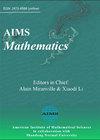A review on portfolio optimization models for Islamic finance
IF 1.8
3区 数学
Q1 MATHEMATICS
引用次数: 1
Abstract
The era of modern portfolio theory began with the revolutionary approach by Harry Markowitz in 1952. However, several drawbacks of the model have rendered it impractical to be used in reality. Thus, various modifications have been done to refine the classical model, including concerns about risk measures, trading practices and computational efficiency. On the other hand, Islamic finance is proven to be a viable alternative to the conventional system following its outstanding performance during the financial crisis in 2008. This emerging sector has gained a lot of attention from investors and economists due to its significantly increasing impact on today's economy, corresponding to globalization and a demand for a sustainable investment strategy. A comprehensive literature review of the notable conventional and Islamic models is done to aid future research and development of portfolio optimization, particularly for Islamic investment. Additionally, the study provides a concisely detailed overview of the principles of Islamic finance to prepare for the future development of an Islamic finance model. Generally, this study outlines the comprehensive features of portfolio optimization models over the decades, with an attempt to classify and categorize the advantages and drawbacks of the existing models. The trend of portfolio optimization modelling can be captured by gathering and recording the problems and solutions of the reviewed models.伊斯兰金融投资组合优化模型综述
现代投资组合理论的时代始于哈里•马科维茨(Harry Markowitz) 1952年提出的革命性方法。然而,该模型的一些缺点使其在现实中无法使用。因此,对经典模型进行了各种修改,包括对风险度量、交易实践和计算效率的关注。另一方面,伊斯兰金融在2008年金融危机期间的出色表现证明了它是传统金融体系的可行替代方案。随着全球化和对可持续投资战略的需求,这一新兴行业对当今经济的影响越来越大,因此受到了投资者和经济学家的广泛关注。对著名的传统模型和伊斯兰模型进行了全面的文献回顾,以帮助未来的投资组合优化研究和发展,特别是对伊斯兰投资。此外,该研究提供了伊斯兰金融原则的简明详细概述,为伊斯兰金融模式的未来发展做准备。总体而言,本研究概述了近几十年来投资组合优化模型的综合特征,并试图对现有模型的优缺点进行分类和分类。通过收集和记录审查模型的问题和解决方案,可以捕获投资组合优化建模的趋势。
本文章由计算机程序翻译,如有差异,请以英文原文为准。
求助全文
约1分钟内获得全文
求助全文
来源期刊

AIMS Mathematics
Mathematics-General Mathematics
CiteScore
3.40
自引率
13.60%
发文量
769
审稿时长
90 days
期刊介绍:
AIMS Mathematics is an international Open Access journal devoted to publishing peer-reviewed, high quality, original papers in all fields of mathematics. We publish the following article types: original research articles, reviews, editorials, letters, and conference reports.
 求助内容:
求助内容: 应助结果提醒方式:
应助结果提醒方式:


